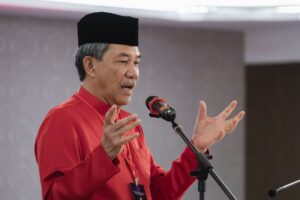KUALA LUMPUR: The government is closely monitoring ‘swinger’ activities in the country and has taken action against such networks, says Home Minister Datuk Seri Saifuddin Nasution.
He said this offence involves individuals or couples engaging in partner-swapping for sexual purposes by mutual consent, which is covered by several existing laws.
“Under the Penal Code alone, five sections are applicable—covering advertising or offering prostitution services, intercourse against the order of nature, acts of gross indecency, obscenity and pornography, and the distribution or possession of pornographic materials,” he told the Dewan Rakyat on Tuesday (Aug 19).
Other relevant laws include Section 233(1)(a) of the Communications and Multimedia Act for misuse of platforms to distribute indecent content, the Sexual Offences Against Children Act 2017 if minors are involved, the Film Censorship Act for producing or distributing explicit recordings, and state Syariah enactments.
Saifuddin cited a case from August 2024, when D7 (gambling and vice prevention) police infiltrated a website promoting swinger activities.
“We raided a luxury condominium in Kuala Lumpur and arrested public and private university students, civil servants, and foreigners.
“The case was charged under Section 372 of the Penal Code and prosecution is ongoing,” he said, adding that equipment and accounts used for the site’s operations were seized.
Saifuddin then said that enforcement must be coupled with preventive measures, especially instilling good values within families and communities.
“Technology, if used for the wrong purposes, can have harmful consequences,” he said.
Saifuddin also revealed a disturbing case this year involving a 12-year-old girl who, with four friends, set up a website and managed a WhatsApp group with 762 members.
“They took photos of their body parts and sold them. The girl even dropped out of school because her monthly income exceeded her parents’ combined earnings,” he said.
He said that while enforcement action can be taken, such cases present legal and ethical challenges.
“When we act against minors, Suhakam reminds us that children cannot be tried in open court. The question then arises; what happens to their future? This is why we need input from other agencies,” he said.
Saifuddin added that the Home Ministry works closely with other agencies, including the ministries of Women, Family and Community Development, Communications, and Education to address the issue comprehensively.






